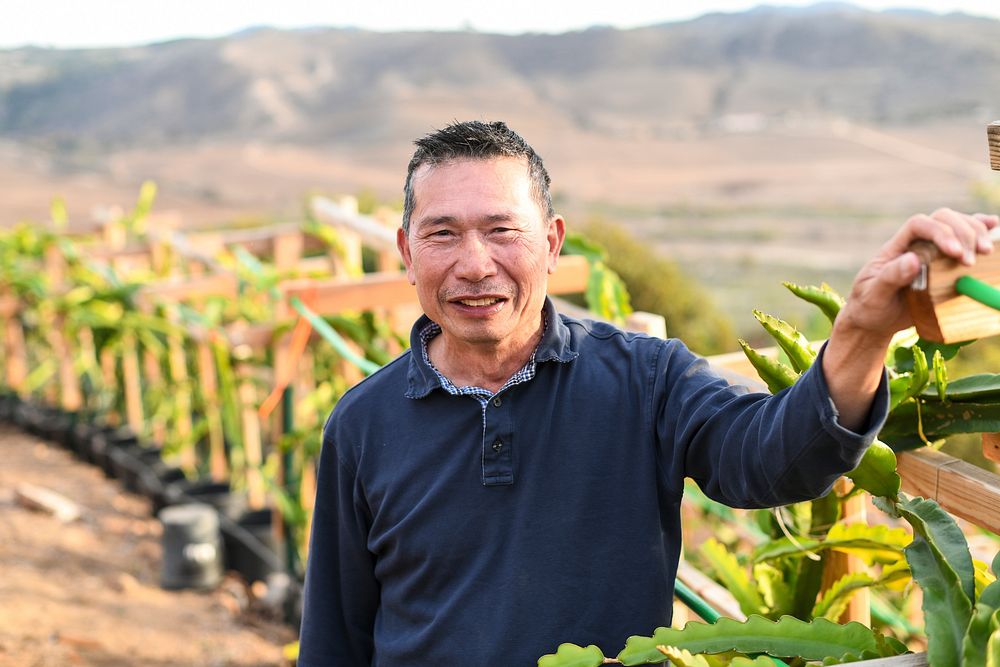
New farmer Leonardo Aguila checks the dragon fruit plants on his 6.3-acre farm in Fallbrook, CA, on Nov. 11, 2018.
Leonardo Aguila is extremely proud of his 6.3-acre farm in Fallbrook, Calif. The mature orchard of avocado trees, on its sunny hillside near San Diego, caught the eye of this Navy veteran three years ago, and he knew he had to buy it. Some of the trees showed signs of stress due to lack of irrigation from the high cost of water and regular drought - it just needed some tender loving care. Aguila knew he was the one to provide it. Born in the Philippines, Aguila immigrated to Guam, a United States territory, as a young man and promptly enlisted into the U.S. Navy. He served in the military for 17 years and dedicated another 17 years as a civilian employee for the Department of the Navy. Once retired, he saw the avocado orchard and longed to live the life he remembered as a child, growing up near orchards of mango, coconut, and banana farming in the Philippines. But in the Philippines, the island received plenty of rainfall to nourish plants. In California, farms need efficient irrigation to help the trees stay healthy. And, due to the orchard being on a steep hillside with erosion concerns, something had to be done to prevent the hillside from being washed away when it rained. “The greatest challenge I have is during the summer,” said Aguila. “On average, I paid $800 per month for irrigation water. Even if I do not use a drop, I still get charged a minimum of $200 per month. So, I need to conserve and use as little as needed.” Looking for help, Aguila discovered the USDA Natural Resources and Conservation Service (NRCS), where he met Soil Conservationists Daniel Holtz and Axel Sanchez. Together, they came up with a conservation plan, and eventually applied for financial assistance through the Environmental Quality Incentives Program (EQIP), to address gully erosion with an underground outlet pipeline, installed a new, efficient irrigation system, and began an irrigation water management (IWM) regimen. Additionally, Aguila has diversified his crops with dragon fruit and cherimoyas, and propagates the plants himself, producing three varieties of dragon fruit: American Beauty (red flesh), Delight (white flesh), and Physical Graffiti (light purple flesh). In the future, he plans to begin selling these potted plants to help him cover operating costs, while the orchard matures and recovers from a prolonged drought. Aguila remains committed to learning more and more about farming. Recently, he planted 100 more avocado trees and enjoyed his daily work of watering the potted dragon fruit, removing hungry snails, building more trellis, and various other projects. Additionally, he has been attempting to establish local Asian markets for commercial customers. ‘The best advice I can give to other farmers is to ‘get your hands dirty,’” added Aguila. “Don't depend on one crop. Try to diversify as much as possible. And, conserve resources as much as possible as well.” Farm Production and Conservation (FPAC) is the Department’s focal point for the nation’s farmers and ranchers and other stewards of private agricultural lands and non-industrial private forest lands. FPAC agencies implement programs designed to mitigate the significant risks of farming through crop insurance services, conservation programs, and technical assistance, and commodity, lending, and disaster programs. The agencies and services supporting FPAC are the Farm Service Agency (FSA), Natural Resources Conservation Service (NRCS), and Risk Management Agency (RMA). The Natural Resources Conservation Service has a proud history of supporting America’s farmers, ranchers, and forest landowners for more than 80 years. USDA helps people make investments in their operations and local communities to keep working lands working, boost rural economies, increase the competitiveness of American agriculture, and improve the quality of our air, water, soil, and habitat. From weather to pests, and from a lack of time to markets, each American farmer faces a unique set of challenges. The Environmental Quality Incentives Program (EQIP) helps agricultural producers confront those challenges – all while conserving natural resources like soil, water, and air. This voluntary conservation program helps producers make conservation work for them. Together, NRCS and producers invest in solutions that conserve natural resources for the future while also improving agricultural operations. Through EQIP, NRCS provides agricultural producers with financial resources and one-on-one help to plan and implement improvements, or what NRCS calls conservation practices. Using these practices can lead to cleaner water and air, healthier soil and better wildlife habitat, all while improving agricultural operations. Through EQIP, you can voluntarily implement conservation practices and NRCS co-invests in these practices with you.
USDA Photo By Lance Cheung. Original public domain image from Flickr